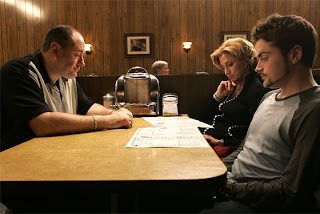
Galatea 2.2 by Richard Powers
Richard Powers' most recent novel The Echo Maker won last year's National Book Award in the US and was a finalist for the Pulitzer Prize. It tells the story of Mark, a truck driver who wakes from a coma after an accident and believes that his sister, who has returned home to nurse him, is an actually an imposter. Reeling from this rejection she contacts renowned neurologist Gerald Weber who recognising the rare Capgras Syndrome comes to investigate. It is filled with sound science, dense prose and a meticulous dissection of human life and thoughts; in other words exactly what you would expect from Powers. His writing is not to all tastes but at its best, as in The Gold Bug Variations, which combines genetics, music, and computer science, it can be some of the most invigorating and challenging writing available.
Whilst still waiting for some books to be delivered after the postal strike I have been stumbling into second hand bookshops and following my nose. On one such recce I found a copy of Powers pseudo-autobiographical novel Galatea 2.2. It concerns a certain Richard Powers who returns to his old University, after the end of a relationship with a former student, stumbling along in a state of limbo disillusioned with both reading and writing. Whilst there he meets Philip Lentz a combative computer scientist who convinces Powers to be part of an experiment. He has made a bet with fellow scientists that he can produce a computer that can perform literary criticism which is indistinguishable from that written by a human. Powers task is to 'teach' the computer.
This is very clever update of the Pygmalion myth. The various implementations of the machine develop into 'Helen' who is capable eventually of asking what sex and race she is, even what she looks like. Powers is consistently amazed at how his pupil seems to be developing consciousness, but is slow in realising that the real subject of the experiment is himself. As he introduces her to a history of literature it is her who is helping him to re-engage with the world. Told in parallel is the story of the relationship which has rendered Powers so disconnected at the start of the novel. Refered to only as 'C', theirs was an insular relationship built on the books they read together. In the present day Powers fixates on another student, this one known only as 'A', who becomes for him a new, improved version of 'C' and also the student against whom his 'Helen' will compete. All very clever as I said and that of course is the problem.
It isn't that the writing is dry or cool or clinical although on discovering that Lentz has scoliosis it is difficult to relate to Powers thinking:
'I was sorry I'd let him get under my skin. Even someone who has modeled the function of the inferior frontal gyrus might still be plagued by the monsters that gyrus modeled'.
Powers can still provide a great one-liner like:
'He looked as if he'd taken self-tanning cream orally'.
He can also write with great emotion, particularly when describing the death throes of his relationship with 'C' or the visits with Lentz to see his wife Audrey, reduced to a paranoid shell of herself by dementia. But where structure leant such strength to Gold Bug, the four notes of the music combining with the four parts of human genetic code, shedding light on each other, this novel is far less succesful, the connections between plots misfiring like faulty synapses in the brain. Picking it up each time I felt I was starting again, needing to tune my ear in to the prose. Powers melding of science and literature is bound to work better in some places than others, where this book works best is as a very imaginative way of writing about writing again when you think you can't. Through the pursuits of this fictional Powers in creating his Galatea and looking back on what has helped and shaped his writing so far, the real Powers is able to write again and bring us Galatea 2.2, inspired by the voice that commands him to 'See everything for me'.
Read more...






















